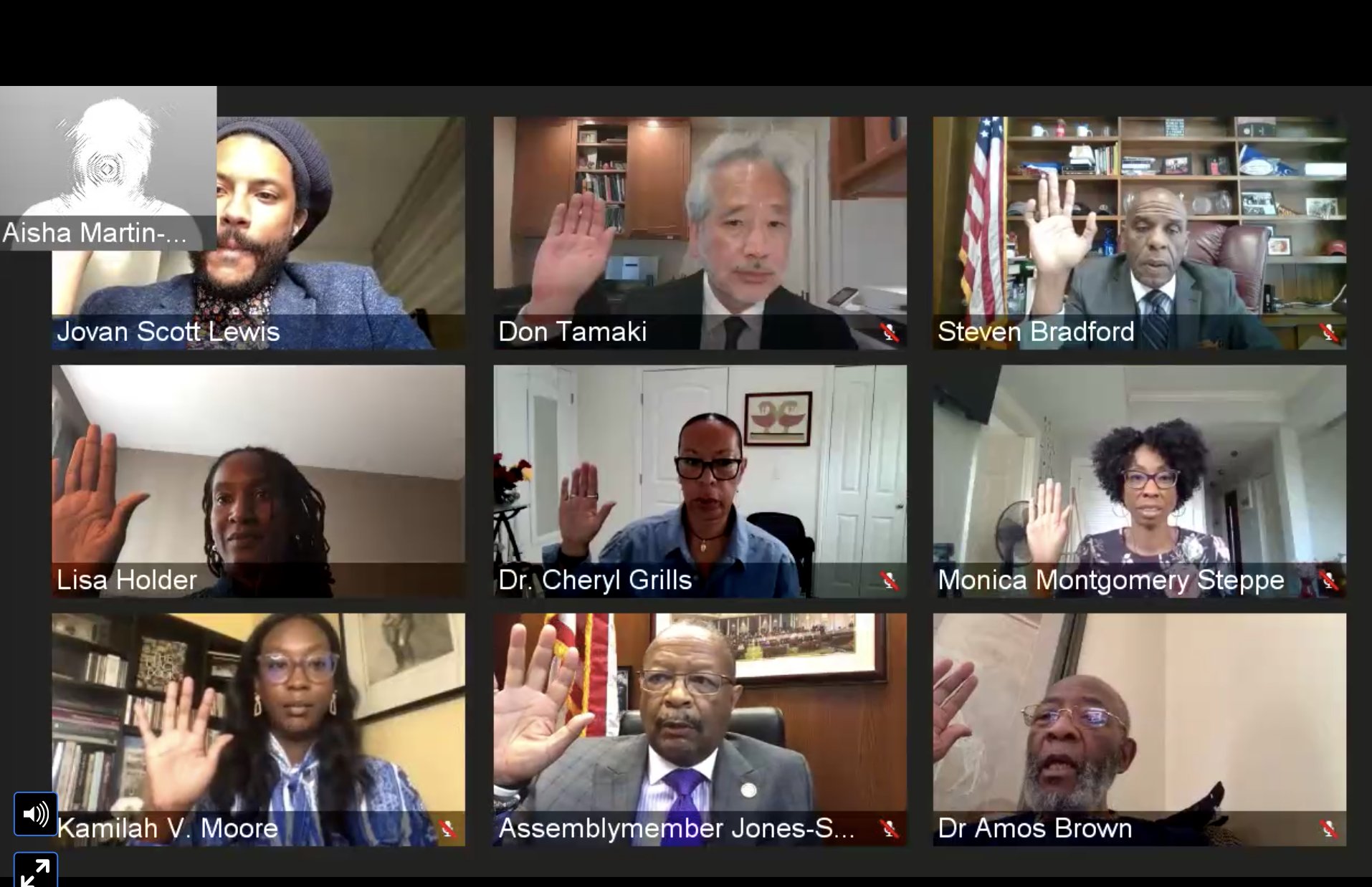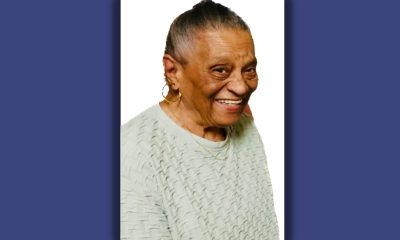Activism
California Reparations Task Force Elects Leadership
The newly elected leaders represent an inter-generational team, bridging the millennial and baby boomer generations, which are known for their often-conflicting worldviews.

The California Task Force to Study and Develop Reparation Proposals for African Americans hosted its first public meeting June 1.
The virtual gathering marked the official launch of the first-in-the-nation initiative organized to investigate how a state engaged in and benefitted from slavery, and how it practiced or condoned racial discrimination, excluding African Americans from economic and other opportunities.
During the meeting that lasted over four hours, the nine-member task force elected Kamilah V. Moore, a Los Angeles-based activist and attorney, as its chair. The group also elected Rev. Dr. Amos Brown, pastor of Third Baptist Church in San Francisco and president of the San Francisco NAACP branch, as vice chair.
The newly elected leaders represent an inter-generational team, bridging the millennial and baby boomer generations, which are known for their often-conflicting worldviews.
Moore, who passed the California bar examination in January, intends to use her studies in domestic and international human rights to provide perspective on, “how the recommendations comport with international standards of remedy for wrongful injuries caused by the state, that includes all reparations and special members measures as understood by various international protocols laws and findings,” she said.
In her term as chairperson, Moore says she will provide expertise on, “how the state of California will offer a formal apology on behalf of the people of California for the perpetuation of gross human rights violations and crimes against humanity against Black Americans who descend from chattel slavery in the United States.”
A history buff and student of Dr. Martin Luther King, Jr., civil rights veteran Brown has dedicated more than six decades of his life to fighting for racial justice and equality.
“I’m concerned about our people and making sure that we stay on point in terms of delivering the sons and daughters of Africa what belongs to them,” said Brown.
The task force will be collaborating with the California Department of Justice to conduct research and provide recommendations for compensation based on the requirements of Assembly Bill 3121, the legislation that paved the way to set up the task force.
The reparations task force will work with renowned researchers and scholars to both quantify and qualify the damage slavery had on African Americans in California. The collaborators will conduct extensive research to examine the economic, educational, and social injustices suffered by descendants of enslaved Black people in the United States.
Kirsten Mullen and William A. Darity, Jr., co-authors of the book, “From Here to Equality: Reparations for Black Americans in the 21st Century,” will provide general guidance for ways the state needs to implement reparations.
History professor Stacy Smith will offer expertise on the impact of slavery specific to California and how racial injustices affected the descendants of enslaved Africans.
Loyola Marymount University African Studies professor Marne Campbell will lead a research team that includes students to compile a report on various federal and state laws, regulations, policies, and practices that discriminate against African Americans.
“We must be aggressive in our efforts, be honest and direct, and figure out what we need to do in California, and be an example to the rest of the nation,” said California Secretary of State Shirley Weber, who authored the bill when she was an assembly member representing the 79th District in the San Diego area.
Weber said that the inaugural meeting is a historic moment that is 400 years overdue for African Americans.
“It’s time for folks to acknowledge the harm that’s been done, the harm that continues to be done,” said Weber.
“We are here today because the racism of slavery birthed an unjust system and a legacy of racial harm and inequality that continues today in every aspect of our lives,” she said.
“We are here today not just to seek an answer to say, ‘Was there harm?’ But your task is to determine the depth of the harm, and the ways in which we are to repair that harm,” Weber said to the task force.
Besides Brown and Moore, other task force members are state Sen. Steven Bradford (D-Gardena); Assemblymember Reggie Jones-Sawyer (D-Gardena); Cheryl Grills, a clinical psychologist; Lisa Holder, a racial and social justice attorney; Jovan Lewis, a social scientist who focuses on racial and economic disparities; Monica Montgomery Steppe, a San Diego city councilmember; and Donald Tamaki, an attorney who worked on the landmark case that won reparations for Japanese internment camp victims.
The task force is scheduled to host a follow-up public meeting in July to finalize the scope of their study — and how they will move the reparations conversation forward in California.
Activism
WOMEN IMPACTING THE CHURCH AND COMMUNITY
Juanita Matthews, better known as “Sister Teacher,” is a walking Bible scholar. She moved to California from the great state of Arkansas in 1971. Sister Teacher has a passion for teaching. She has been a member of Bible Fellowship Missionary Baptist Church since 1971.

Sister Juanita Matthews
55 Years with Oakland Public School District
The Teacher, Mother, Community Outreach Champion, And Child of God
Juanita Matthews, better known as “Sister Teacher,” is a walking Bible scholar. She moved to California from the great state of Arkansas in 1971. Sister Teacher has a passion for teaching. She has been a member of Bible Fellowship Missionary Baptist Church since 1971. She followed her passion for teaching, and in 1977 became the lead teacher for Adult Class #6. Her motto still today is “Once My Student, Always My Student”.
Beyond her remarkable love for the Lord, Sister Teacher has showcased her love for teaching by working for the Oakland Unified School District for 55 years, all but four of those years spent at Emerson Elementary and Child Development School. She truly cares about her students, making sure they have the tools/supplies needed to learn either at OUSD or Bible Fellowship Missionary Baptist Church.
She’s also had a “Clothes Closet Ministry” for 51 years, making sure her students have sufficient clothing for school. The Clothes Closet Ministry extends past her students, she has been clothing the community for over 50 years as well. She loves the Lord and is a servant on a mission. She is a loving mother to two beautiful children, Sandra and Andre. This is the impact this woman of God has on her church and the community.
Activism
Oakland’s ‘Green the Church,’ Others, Host a Climate Revival
On April 20, Oakland’s Green The Church California (GTC) and the Center For Food, Faith and Justice will celebrate Earth Day and present a Climate Revival event titled “Growing Healthy Communities From Soil To The Soul” at McGee Avenue Baptist Church at 1640 Stuart St, Berkeley, CA. The day will include inspiring talks, interactive workshops, networking opportunities, and a special panel on Food Sovereignty and Global Food Resilience.

Growing Healthy Communities from Soil to the Soul in Berkeley
By Y’Anad Burrell
On April 20, Oakland’s Green The Church California (GTC) and the Center For Food, Faith and Justice will celebrate Earth Day and present a Climate Revival event titled “Growing Healthy Communities From Soil To The Soul” at McGee Avenue Baptist Church at 1640 Stuart St, Berkeley, CA,
The day will include inspiring talks, interactive workshops, networking opportunities, and a special panel on Food Sovereignty and Global Food Resilience.
The keynote speaker is Rev. Danté R. Quick, PhD, senior pastor of First Baptist Church of Lincoln Gardens in Somerset, N.J. Quick is well known in the Bay Area, having served for more than 10 years as pastor of Friendship Missionary Baptist Church in Vallejo, CA.
Green The Church, founded in 2010 by Rev. Dr. Ambrose Carroll, Sr., and headquartered in Oakland, helps galvanize Black churches and their local communities and leaders to address issues critical to populations historically disengaged from conversations around pollution and health, climate change, and sustainability and energy efficiency.
The organization collaborates with major environmental, sustainability, food security, faith, and community-based non-profit organizations, and is committed to “creation justice”—care and justice for God’s people and the planet—and building the Beloved Community.
Environmental justice has long been a pressing concern for communities of color who bear the brunt of pollution and ecological degradation. Climate change exacerbates these issues, disproportionately impacting vulnerable communities. Recognizing this urgency, Black churches across the country are taking action.
With deep roots in the African American community and its commitment to social justice, the Black Church has become an essential advocate for sustainable practices and policies.
Over the past 14 years, in a powerful collaboration with significant environmental, sustainability, food security, faith, and community-based non-profit organizations, GTC has created a cadre of Black churches engaging in the environmental justice, climate, and sustainability movement.
GTC presently works with more than 1,000 pastors and congregations across the U.S., and groups in the Bahamas, Ghana, Nigeria, and the UK, showing that we can make a difference together.
The partnership between environmental justice advocates and the Black Church extends beyond individual congregations. Green The Church provides resources and support for faith communities seeking to address climate change and promote environmental justice.
Through collaboration, initiatives such as energy efficiency programs, solar installations, and environmental education have been implemented in Black churches nationwide. These efforts reduce the carbon footprint and save money on energy bills, benefiting the congregations and their communities.
The involvement of the Black Church in the fight against climate change is not just a participation, it’s a powerful message that galvanizes action across communities.
By integrating environmental justice into their ministry, Black churches are demonstrating that addressing climate change is not only a matter of science but also of social and moral responsibility, inspiring change at a grassroots level.
For more information, go to: www.greenthechurch.org.
Activism
Oakland Post: Week of April 10 – 16, 2024
The printed Weekly Edition of the Oakland Post: Week of April 10 – 16, 2024

To enlarge your view of this issue, use the slider, magnifying glass icon or full page icon in the lower right corner of the browser window. ![]()
-

 Activism4 weeks ago
Activism4 weeks agoOakland Post: Week of March 20 – 26, 2024
-

 #NNPA BlackPress3 weeks ago
#NNPA BlackPress3 weeks agoCOMMENTARY: D.C. Crime Bill Fails to Address Root Causes of Violence and Incarceration
-

 #NNPA BlackPress3 weeks ago
#NNPA BlackPress3 weeks agoMayor, City Council President React to May 31 Closing of Birmingham-Southern College
-

 #NNPA BlackPress3 weeks ago
#NNPA BlackPress3 weeks agoCOMMENTARY: Lady Day and The Lights!
-

 #NNPA BlackPress3 weeks ago
#NNPA BlackPress3 weeks agoFrom Raids to Revelations: The Dark Turn in Sean ‘Diddy’ Combs’ Saga
-

 #NNPA BlackPress3 weeks ago
#NNPA BlackPress3 weeks agoBaltimore Key Bridge Catastrophe: A City’s Heartbreak and a Nation’s Alarm
-

 #NNPA BlackPress3 weeks ago
#NNPA BlackPress3 weeks agoBaltimore’s Key Bridge Struck by Ship, Collapses into Water
-

 Activism3 weeks ago
Activism3 weeks agoOakland Post: Week of March 27 – April 2, 2024













































